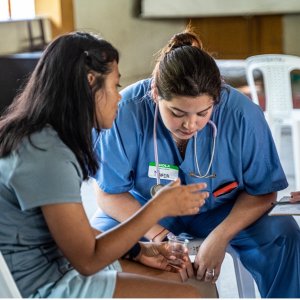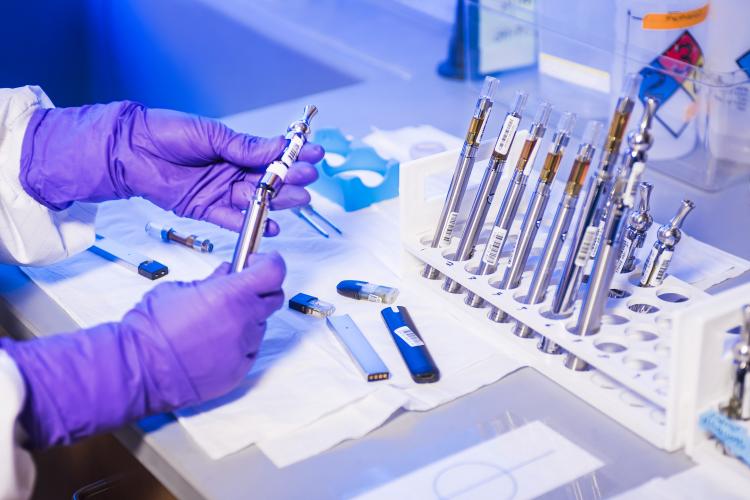Program Overview
- Bachelor's Degree
- Research Minor
The Biomedical Sciences (BMD) program prepares students for careers in medicine, pharmacy, dentistry, physical therapy, optometry, biomedical research, physician assistant, occupational therapy and other health related fields. The BMD program provides courses at the undergraduate level that gives students a competitive edge for admission into post graduate programs. Graduates from the BMD program have a successful track record of acceptance into graduate and professional health care programs.
Bachelor Degree
The biomedical sciences (BMD) curriculum has a strong science foundation with over 60 hours of course work in the disciplines of Biology and Chemistry, including courses in Histology, Microbiology, Pathophysiology, Immunology, Epidemiology, and Infectious Diseases. Along with the strong science foundation, general education courses in Biomedical Ethics, Spiritual Aspects of Health Care, Medical Sociology, U.S. Health Care Systems, Literature and Medicine, and Writing for the Health Profession helps prepare the students for the people-oriented, technology-based health care profession.
Research Minor
Have you ever thought about a career in research? Would like to get a "hands on" experience to better under-stand concepts in class? Then the Research Minor may be for you.
Whether you are interested in better understanding the basic and/or clinical sciences, pursue a career in research, or bolster your credentials on an application for a professional clinical program, research is one of the most beneficial displays of scholarship one participate in at the undergraduate level.
ARTICULATION AGREEMENTS
A major goal for this program is to make the transition from the biomedical sciences program to professional/graduate schools as seamless as possible. Thus, the BMD program has developed the following articulation agreements.

Why Biomedical Sciences at Baptist University?
- Faith-based atmosphere
- Low Student to Faculty Ratio
- Accelerated Curriculum
- Entrance Exam Preparation Incorporated in Major Courses
- Career and Professional Program Advising
- Articulation Agreements with Professional Health Care Programs
- Opportunities for Research
- Doctoral Prepared Faculty

"I was hesitant when I started college, especially when it came to connecting with other students and with my professors. Baptist immediately felt like home. I made some of the best friends throughout my time here and found myself talking to my professors for hours. The university also gave me so many opportunities, including a mission trip in Peru and a volunteer position at one of the hospitals. I'm so grateful for Baptist, and I can't imagine my undergraduate experience anywhere else."

Career Opportunities
- Dentists
- Occupational Therapists
- Optometrists
- Pharmacists
- Physicians & Surgeons
- Physician Assistants
- Physical Therapists
- Speech-Language Pathologists
More Information
Opportunities to develop health care research projects enhance the strong science-based curriculum that prepares students for graduate school. A biomedical sciences major will have a unique advantage to complete courses such as histology, immunology, epidemiology, endocrinology and genetics that are often limited to graduate students. Providing these courses at the undergraduate level gives our biomedical sciences graduates a competitive edge for admission to graduate and professional programs.
Mission
The mission of the Biomedical Sciences Program is to prepare graduates with a solid foundation in natural and health sciences who demonstrate scientific proficiency and critical thinking skills to succeed in graduate schools and professional programs and/or careers in the health sciences field.
Program Goals
- To provide students with the opportunity to acquire the concepts, facts, principles, terminology, and theories fundamental to all health care professions and related fields.
- To develop skills deemed necessary for continued intellectual growth.
- To aid students in developing a strong foundation in the discipline that will make them nationally competitive for admission into graduate programs.
Program Learning Outcomes
At the completion of the biomedical sciences program, the graduate will:
- Use analytical skills to apply concepts in the biological sciences, chemistry, physics, and mathematics.
- Integrate concepts in the biological sciences, chemistry, physics, and mathematics.
- Demonstrate scientific literacy.
- Recognize ethical standards and practices in research methods and application to diverse populations.
Advisory Board
The Biomedical Sciences Advisory Committee is made up of professionals within the Medical and Educational career pathways charged with growing the BMD program and assisting students and alumni grow in their professional fields.





